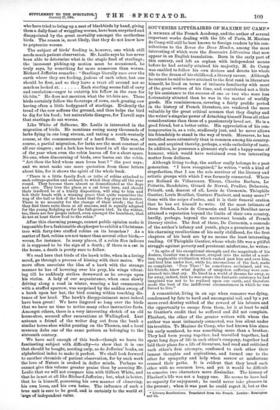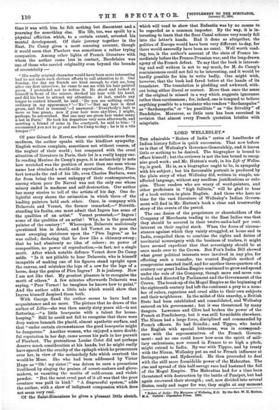SOUVENIRS LITTERAIRES OF MAXIME DU CAMP.* A MEMBER of the
French Academy, and the author of several important works dealing with the life of Paris, M. Maxima du Camp will still be best known to foreign readers by his con- tributions to the Revue des Deuoi Halides, among the most interesting of which were the Souvenirs Litteraires that now appear in an English translation. Born in the early part of this century, and left an orphan with independent means before he had actually attained his majority, M. dn Camp was enabled to follow his own devices and devote his whole life to the dream of his childhood, a literary career. Although he cannot be said to have attained to the first rank in literature himself, he lived on terms of intimate familiarity with most of the great writers of his time, and contributed not a little by his assistance to the success of one or two who were less fortunately situated than he was in the matter of worldly
goods. His reminiscences, covering a fairly prolific period in the history of French literature, are rendered the more valuable by the great critical acumen that they display and the writer's singular power of detaching himself from all other considerations than those of a passionately loved art. He is a good friend, but a better critic. His appreciation of his con- temporaries is, as a rule, studiously just, and he never allows his friendship to stand in the way of truth. Moreover, he has travelled more extensively than is common among his country- men, and acquired thereby, perhaps, a wide catholicity of taste. In addition, he possesses a pleasant style and a happy sense of humour, which would have reclaimed even less interesting matter from dullness.
Although living to-day, the author really belongs to a past generation. " I have recognised," he writes, " with a kind of stupefaction, that I am the sole surviver of the literary and artistic groups with which I was formerly connected. Where are Rolland de Villarceanx, Titeux, Charles Barbara, Le Poitevin, Bandelaire, Gerard de Nerval, Pradier, Delacroix, Preanit, and, dearest of all, Louis de Cormenin, Theophile Gautier, Louis Bouilhet, Gustave Flaubert, and many more ?" Gone with the neiges d'antan, and it is their funeral oration that he has set himself to write. Of the most intimate of these friends, Louis de Cormenin and Louis Bouilhet never attained a reputation beyond the limits of their own country, hardly, perhaps, beyond the narrowest bounds of French literary circles. The first of these, De Cormenin, a comrade of the author's infancy and youth, plays a prominent part in his charming recollections of his early childhood, for the first chapters of his book are by no means the least interesting reading. Of Theophile Gautier, whose whole life was a pitiful struggle against poverty and persistent misfortune, he writes :
" In spite of his exceptional strength and the magnitude of his desires, Gautier was a dreamer, strayed into the midst of a rest- less, implacable civilisation which rushed past him and over him, and trod him under foot, while he, unconscious of the fact, made no complaint. Poor Theo ! ' he sometimes exclaimed, and we, his friends, knew what depths of unspoken suffering were com- pressed into that cry. He lived in a world of dreams far away, so far away, indeed, that he was aware the fantastic existence he had imagined was not to be realised upon our earth, and therefore made the beat of the indifferent circumstances in which he was forced to live."
A romanticist, living in an age when romance was dying, condemned by fate to hard and uncongenial toil, and by a yet more cruel destiny robbed of the reward of his labours and the opportunity to escape from them, let it at least be said to Gantier's credit that he suffered and did not complain. Flaubert, the other of the greater writers with whom the author was most intimately connected, was less silent under his troubles. To Maxime dn Camp, who had known him since his early manhood, he was something more than a brother. They had been young together, had travelled together, had spent long days of life in each other's company, together had laid their plans for a life of literature, had read and criticised each other's first attempts, confessed to each other their inmost thoughts and aspirations, and turned one to the other for sympathy and help when sorrow or misfortune crossed their paths. It is evident that they loved each other with no common love, and yet it would be difficult to conceive two characters more dissimilar. The history of Flaubert's life was not a happy one. He seems to have had no capacity for enjoyment; he could never take pleasure in the present; when it was past he could regret it, but at the
• Lite rary Recollections. Translated from the French. London: Remington
time it was with him he felt nothing but discontent and a yearning for something else. His life, too, was spoilt by a physical affliction which, to a certain extent, arrested his mental development. Of their journey together in the East, Da Camp gives a most amusing account, though it would seem that Flaubert was sometimes a rather trying companion. Among other lights of French literature with whom the author came less in contact, Baudelaire was one of those who carried originality even beyond the bounds of eccentricity :-
" His really original character would have been more interesting had he not made such obvious efforts to call attention to it. One Sunday, the day my friends are kind enough to visit me, long after our first interview, he came to see me with his hair painted green. I pretended not to notice it. He stood and looked at himself in front of the mirror, stroked his hair with his hand, and did his best to attract my attention. At last, unable any longer to control himself, he said : Do you see nothing extra- ordinary in my appearance ? No !'—`But my hair is dyed green, and that is unusual?—I answered : Everybody's hair is more or less green ; now if your hair were sky-blue, I might, perhaps, be astonished. But one may see green hair under many a hat in Paris.' He took his departure very soon afterwards, and meeting a friend of mine in the courtyard, he said to him : I recommend you not to go and see Du Camp to-day ; he is in a vile temper !'"
Of poor Gerard de Nerval, whose eccentricities arose from madness, the author speaks with the kindliest sympathy. English writers complain, sometimes not without reason, of the neglect of their world ; but compared with the cruel situation of literature in Paris, their lot is a really happy one. In reading Maxime du Camp's pages, it is melancholy to note how wretched was the position of more than one man whose name has obtained a world-wide reputation. Gautier, Flau- bert towards the end of his life, even Charles Barbara, were far from being the most unhappy of their contemporaries, among whom poor De Nerval was not the only one whose misery ended in madness and self-destruction. Our author has many stories to tell of the artists of his day. One de- lightful story shows the estimation in which three of the leading painters held each other. Once, in company with Delacroix and Vernet, the former remarked,—" Notwith- standing his faults, one must admit that Ingres has some of the qualities of an artist." Vernet protested,—" Ingres ! some of the qualities of an artist ! Why, he is the greatest painter of the century ! " Whereupon Delacroix maliciously questioned him in detail, and led Vernet on to pass the most sweeping strictures upon the "Pere Ingres," as he was called ; declaring that he drew like a chimney-sweep ; that he had absolutely no idea of colour; no power of composition, no power of reproduction,—in fact, not a single merit. After which notable defence Vernet drew Dn Camp aside. " Is it not pitiable to hear Delacroix, who is himself incapable of making one of his figures stand upright upon the canvas, and mistakes the legs of a cow for the legs of a horse, deny the genius of Pere Ingres P It is jealousy. Now I am not like that. My greatest pleasure is to recognise the merit of others." A few minutes afterwards Delacroix was saying, " Poor Vernet ! he imagines he knows how to paint." And the author adds a little tale which would show that Ingres himself despised them both.
With George Sand the author seems to have had an acquaintance and no more. The picture that he draws of the author of Lelia—she was then nearly sixty years old—is not flattering,—" a little bourgeoise with a talent for house- keeping." Still he could not fail to recognise that there were deep waters beneath the placid, almost apathetic surface, and that "under certain circumstances the good bourgeoise might be dangerous." Another woman, who enjoyed a more doubt- ful reputation in her day, came across his path in her pursuit of Flaubert. The pretentious Louise Colet did not perhaps deserve much consideration at his hands, but he might really have spared her the cruelty of the epitaph which he pronounces over her, in view of the melancholy fate which overtook the would-be Muse. She who had been addressed by Victor Hugo as " Oh ! my sister !" was driven to earn a precarious livelihood by singing the praises of corset-makers and glove- makers, or vaunting the merits of cold-cream and violet- powder. " But the most cruel part of it all was that the poor creature was paid in kind." " A disgraceful system," adds the author, with a show of indignant compassion which does not seem very real.
Of the Saint-Simonians he gives a pleasant little sketch, which will tend to show that Enfantin was by no means to be regarded as a common imposter. By the way, it is in- teresting to learn that the Suez Canal scheme very nearly fell into the latter's hands. Had it done so altogether, the politics of Europe would have been very different to-day, for there would assuredly have been no canal. Well worth read- ing, too, is the author's account of the state of France im- mediately before the Franco-Prussian war, and the long-drawn agony of the French defeat. To say that the book is interest- ing and well written is not to say much, for M. du Camp's reminiscences could not fail to be interesting, and it would be hardly possible for him to write badly. One might wish, however, that the book had fared better at the hands of its translator. The translation is plodding and awkward, with- out being either literal or correct. More than once the sense of the original is missed in a way which suggests ignorance rather than carelessness ; for, indeed, one is tempted to believe anything possible to a translator who renders " Sardanapales " as " Sardanapolis," or " lea puerilites " as " the frivolity" of Baudelaire. Moreover, so little care has been exercised in revision that almost every French quotation bristles with misprints.



















































 Previous page
Previous page